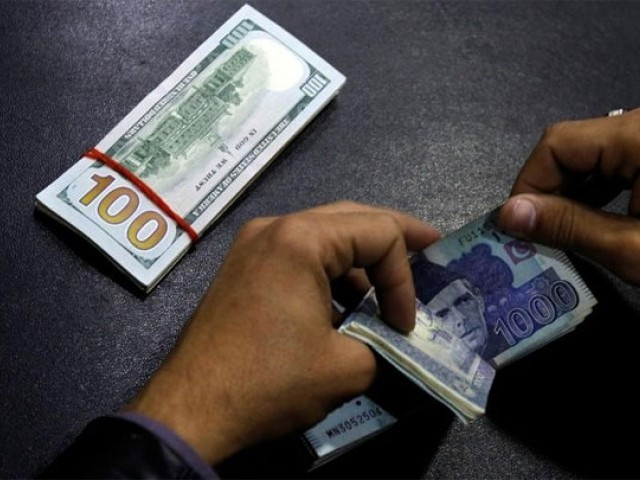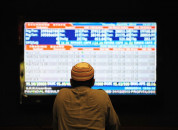Impact of rupee depreciation to be felt after some time
Pakistan must look into internet-based export of services to bridge trade gap

Rupee weakens. PHOTO:FILE
This supposedly should have resulted in an increase in exports and a decline in trade deficit. Although exports have ticked up, the country witnessed its highest-ever trade deficit in recent times.
All this seems paradoxical, isn’t it? However, the concept and theory of J curve can help us understand this situation.
According to this theory, a country’s trade deficit increases immediately after currency depreciation. The reason behind this is the fact that contracts for the past several months have already been negotiated by the trading parties.
Hence, price competitiveness of exports resulting from the depreciation doesn’t increase immediately. Furthermore, the buyers may have negotiated some long-term contracts with exporters in other countries and it is not possible for them to switch to more price-competitive exports immediately.
Similarly, on the import side after currency depreciation, the import bill initially increases.
Consumers also alter their buying decisions with a lag and they take time and due consideration in moving from more expensive imports to local substitutes and this change will occur only if local substitutes of imported goods are available.
The overall elasticity of imports and exports also has a role to play. If the imports are inelastic, ie import of oil and other necessary items, then their relative increase in prices have very little impact on the import bill.
The point is that we do not have readily available substitutes for oil and furthermore, oil consumption is extremely difficult to curtail whatever the price may be. Therefore, the depreciation will naturally translate into an increase in the import bill.
Similarly, on the export side, if we are exporting elastic goods, ie luxury items, a decline in relative prices due to currency weakness translates into an increase in export orders.
Since Pakistan largely exports textiles, rice, etc, the demand for which is not extremely elastic in nature, a drastic improvement in export quantum is difficult to achieve at least immediately.
However, according to the J curve theory, the deficit will decline over time when export orders will be renegotiated by our buyers and local consumers will shift consumption from imported goods to local substitutes.
Although this J curve mechanism has seldom worked in our history, let’s hope it works this time.
Another problem this time around is slightly novel. It is not only Pakistan that has witnessed such rounds of depreciation. Our competitors like India and Turkey have also gone through such episodes with their currencies also at all-time lows.
This devaluation of our competitors has made ours relatively weak in making exports more price-competitive.
Unfavourable terms of trade
Another long-term issue with perpetual deficits relates to the unfavourable terms of trade for all developing countries.
Prices of goods that developing countries like Pakistan exports ie textiles, commodities, etc have been on a declining trajectory in the past. On the other hand, goods and services exported by the developed world like cars have become relatively more expensive over time.
Furthermore, these luxury items are becoming more expensive and less durable over time. Previously, cars were bought for a lifetime, now it is necessary to replace old ones within a five-year time period.
This situation calls for creative and curious solutions.
Novel solution
Apart from increasing exports from our existing sectors, we must find novel solutions. In my view, the internet has a lot to offer in this regard.
In this era, all the successful business ventures Amazon, Google and Facebook have drawn profits through the internet. We are an intelligent nation abundant with professionals. We must use the internet to export our services.
Our people can coach, teach and tutor the world over the internet. Our students have been doing this on a smaller scale and in an unorganised unguided fashion. If proper platforms are provided to them, we believe they have a lot to offer.
This will bring in foreign exchange and the fruits will be trickled down to the individual professionals. This system will be similar to having an export-oriented SME framework. Standards of living will improve and all the incomes will be coming in through documented economy.
To conclude, it must be suggested that our structural trade deficit needs more attention and scientific curiosity than what we have offered in the past and internet-based export of services must be carefully looked into as one of the many solutions.
The writer is a corporate banker and teaches economics
Published in The Express Tribune, September 17th, 2018.
Like Business on Facebook, follow @TribuneBiz on Twitter to stay informed and join in the conversation.



















COMMENTS
Comments are moderated and generally will be posted if they are on-topic and not abusive.
For more information, please see our Comments FAQ